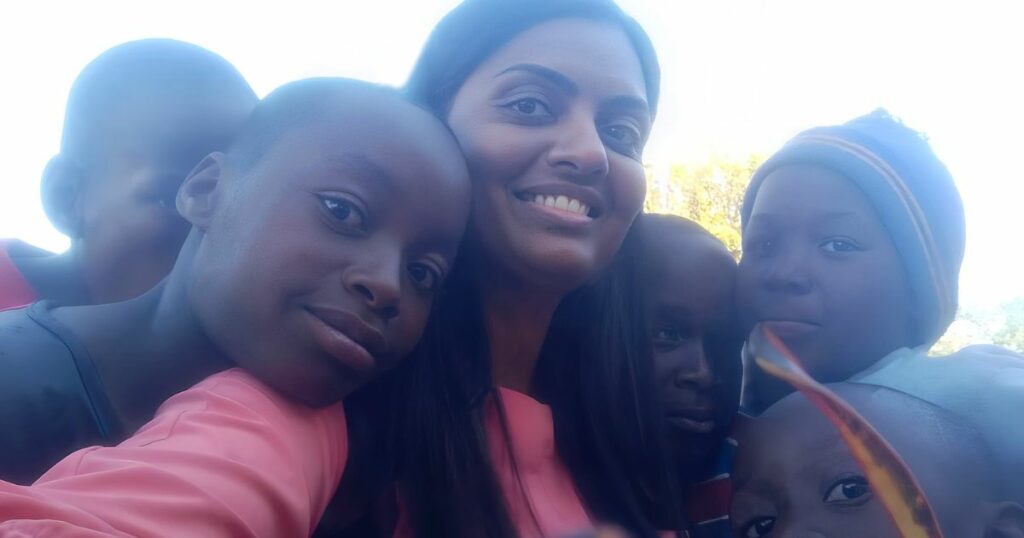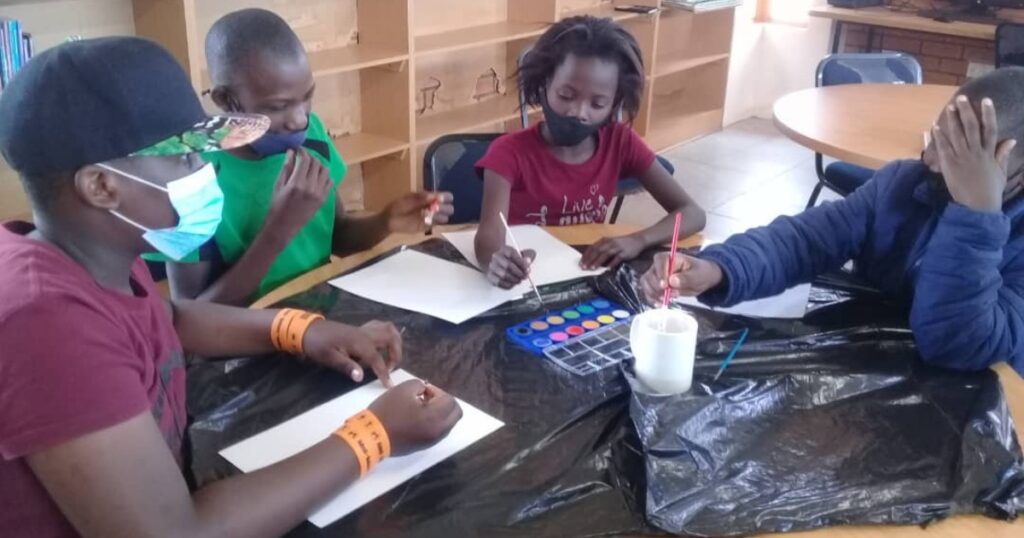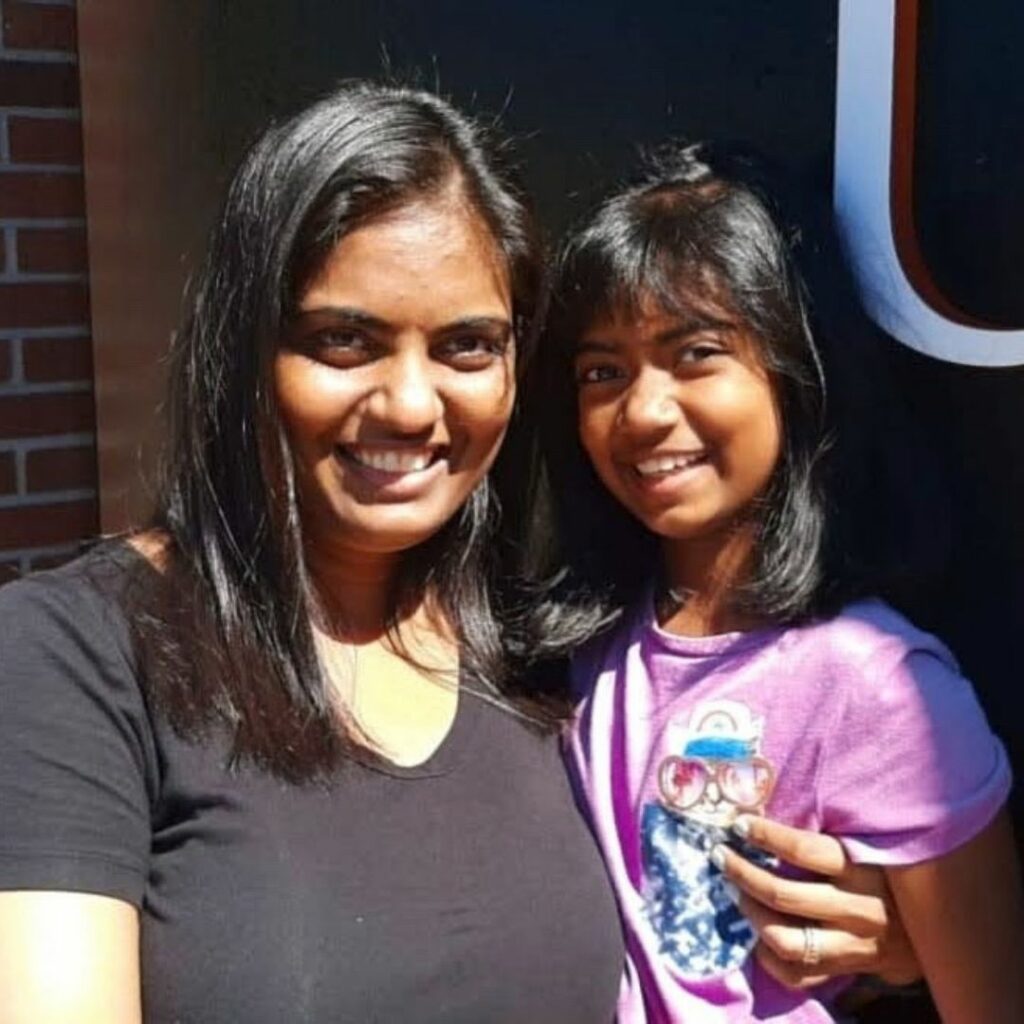
Divya Smitha Yerram Reddy, MPH ’20, makes sure those who follow her have it better than she did by making the most out of her PhD experience, which comes at great personal sacrifice.
Her beneficiaries include her 10-year-old daughter – and untold numbers of young people in Botswana, whom she educates about sexual and reproductive health. And that’s not counting the scores of people she’ll help throughout her life as a public health professional.
Divya holds an undergraduate degree in Ayurvedic medicine, a master’s degree in hospital administration, an MPH degree from OSU and plans to graduate with her PhD in public health — global health in 2024.
The first thing she’ll do after graduation? Pack up and move to her daughter, who has been living with her husband in Canada while she completes coursework.
Until then, she has research and a thesis to complete, as well as another trip to Botswana, Africa – a place she already has visited twice as part of her public health research. The experience, she says, has “cemented what I want to do my entire life.”
Why she chose to study public health
Born and raised in western India, but originally a south Indian, Divya spent her childhood traveling across India with her mother, sister and father, who served in the Indian Air Force.
Those trips exposed her to multiple cultures within India and gave her the gift of being able to acknowledge and respect people’s different lived experiences. She also learned to speak six different Indian languages.
“Across India, the languages are different. So are the culture, language and festivals. Everything is diverse, and everything is different,” she says.
After earning her undergraduate and graduate degrees, she began working with a low-income community in Bangalore, one of the biggest cities in southern India.
“I began to see what this community had to go through in their day-to-day life – less access to health care due to financial issues and lack of knowledge.
“For example, I had an infant die due to meningitis when his parents could not provide him with the required health care. Instead, these parents chose to go for traditional esoteric treatment because that’s what their parents told them to do.”
By the time her daughter was 1 year old, it was challenging to work in the clinic because of the demands on her time. In response, Divya decided to join her daughter’s preschool as a center head and childcare counselor.
Her primary responsibility was caring for parent-child relationships, without realizing this would be one of the main components of her doctoral research. “This work experience prepared me for the future without realizing it,” she says.
“During this job, my boss made me realize on multiple occasions that I could do much more in my career. This gave me the courage to put my passions together and apply for public health programs in the USA.
“I applied to OSU and some schools in Washington and Montana. I was lucky to get admitted to all of them. However, I chose to join OSU because of its reputation.”
Having traveled to the United States before to see family in Seattle, she began her journey with confidence.
“I came knowing what to expect; however, this was still a completely new place, and I was on my own for the first time without any support.
“Like any other international student, I underwent culture shock and had to settle into a new environment.
“I am sincerely thankful to my advisor, Professor Sunil Khanna, and friends who helped me through this phase of my life. Without their support, I might have gone back. I’m glad they were supportive.”
Putting her global health doctoral program to work in Botswana
As part of her master’s internship, Divya was looking for different opportunities. She was focused on getting an opportunity in India since her husband still lived there.
However, it was Professor Khanna who advised her to look for opportunities in other countries to expand her experience. She is glad that she took his advice seriously.
When she arrived in Botswana in 2019, she says, “It was a wonderful moment when I got down from the plane. Dr. Khanna came to pick us up from the airport and I was like, ‘Huh, this looks like India!’”
Another first impression was the friendliness of the people in Botswana.
“It’s a very culturally dominant and colorful country,” she says. “People are always wearing colorful dresses. That atmosphere actually makes you happy. I share a very good relationship with some of the people there.”
That trip was transformative.
“Being in Botswana and with the community for the first time was a wonderful experience, and that was when I realized that this is what I want to do my entire life. I want to work with the community.”

After that first trip to Botswana, she applied for the global health doctoral program and continued her work in the country, which is part of the college’s Botswana Global Health Initiative established by an endowment from Bob and Sara Rothschild.
The initiative is part of ongoing efforts to engage community stakeholders and the Ministry of Botswana to promote lifelong learning, health and well-being in a collaborative, locally meaningful and sustainable manner. It comprises four ongoing community-based projects that include promoting sexual and reproductive health, preventing gender-based violence, mainstreaming disability, and fostering positive youth development.
Professor Sunil Khanna leads the program in Botswana and says, “Divya is doing excellent work in rural Botswana by building strong partnerships with community members, teachers, parents and health care providers to develop and pilot test a comprehensive sexual and reproductive health – SRH – education program for school-aged youth.
“A unique aspect of her research is the emphasis on engaging parents in the SRH education program, recognizing their central role in promoting positive sexual behaviors and outcomes in their children.”
Addressing HIV in Botswana
More specifically, with her global health doctoral program, Divya focuses on addressing HIV in Botswana, which has the fourth highest prevalence in the world. The tools she uses to combat it are twofold: empathy and communication.
“The main theme behind our work is that we are trying to create better communication and better relationships between parents and children so that children can open up and not get wrong information from their peers, but instead get reliable information from their caregivers,” she says.

“For adolescents, we are teaching them about puberty, what to expect, and what sexually transmitted infections are and how they can protect themselves. And then there’s peer pressure, bullying, cyberbullying, digital influences and all that kind of stuff.
“When it comes to caregivers, we talk about how to support children during this phase and how to provide the right information, because if parents do not have the right information, they will not talk to their teens. There’s a lot of research on that. And then we bring them together and discuss what they have learned so far and how they can openly discuss it.”
Divya says her work will help the community fill in gaps by providing required SRH communication and giving caregivers and adolescents the liberty to have open conversations about sexual and reproductive health topics. The comprehensive SRH curriculum will also help them learn about various community resources.
“Last summer, we pilot tested the program with adolescents and their caregivers in the community. This helped us understand what could be improved. That was a lengthy process, so we are reducing the total time for delivering it,” she says.
“During the pilot testing, some of the health care workers came to talk to the community. This was helpful, because there’s significant stigma there about getting help or getting tested for HIV,” she says, adding that people do not want to talk about it and don’t want to get help.
“A health care worker coming to the community was helpful for the caregivers as well as for our project. They were there to connect with the caregivers and adolescents and convince them to come to the clinic if they need help without hesitation.”
Even though the Ministry of Health in Botswana is working toward reducing the number of those infected with HIV, which has been declining, the country still has the fourth highest prevalence of HIV. Divya says this could be related to the taboo about talking openly about SRH topics.
“I am from India, and in my country, I have seen such taboo as a teenager. I’ve seen caregivers who don’t feel comfortable talking about these topics hush a child if they ask questions out of curiosity.
“During my teenage years, I was never taught about puberty and how it’s going to affect me, or how I talk about my problems to an adult in the house. Even though I had a sister who was a doctor, I still had that barrier at home.
“So that empathy or that understanding of culture actually positions me way better in Botswana, and I understand what is happening there.”
Planning for the future
Following graduation, Divya hopes to continue working in the field, interacting with people and developing programs. She also plans to move in with her family in Canada, which includes her daughter.

“For most families, parents are their children’s role models. In my house, it’s the other way around. My daughter is my role model. She teaches me something new every day,” she says.
“Even though I love what I’m doing and am passionate about what I’m doing, I miss her. As soon as I’m done, I’ll pack everything up and return to her. We have been waiting for that day for the past five years.”
To students considering studying global health or traveling outside the United States, she’d like to have a word:
“You need to have an open mindset that whenever you are entering a new country, you are going to indulge in their culture and not take your culture to that country. We have a three-month session before we travel, and Dr. Khanna talks about this each and every session to students.
“The Botswana Global Health Initiative is about utilizing community-based participatory research. We work with the community. We don’t tell them what to do.”
People to know in the CPHHS Botswana Global Health Initiative
Robert (Bob) Rothschild, ’65, and Sara Rothschild are passionate about spreading literacy and promoting community development across Botswana. In 2005, they established the Robert and Sara Rothschild Family Foundation to support worthy philanthropic projects with a major focus on community development and individual empowerment among underserved populations in Botswana.
Since 2007, the foundation has funded construction of libraries as part of the Botswana National Library service. In 2017, the couple established the Robert and Sara Rothschild Endowment Chair in Global Health in the CPHHS to promote unique learning opportunities for students while improving public health and access to community services in Botswana.
Sunil Khanna, PhD, is internationally known for his research in the field of global health. He examines how inclusive, participatory, empowering and sustainable strategies to engage communities in Botswana and India can lead to decolonization of global health. His research also explores how these strategies improve the health and well-being of people in a manner that is locally relevant, engaging and sustainable.